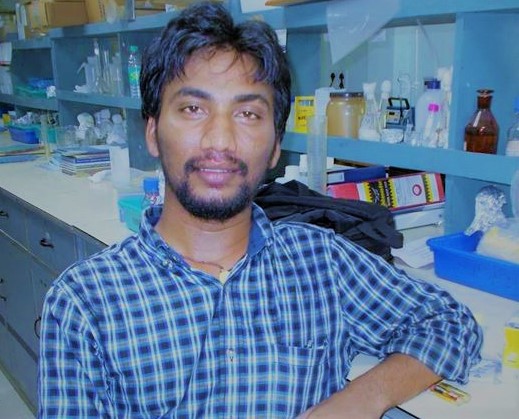
My laboratory is currently involved in two areas of research:
1. Genomic instability is the hallmark of cancer. Though significant amount of work has generated in the area of cell cycle and DNA damage repair for understanding the genomic instability, the molecular mechanism for the transformation process of normal cell into cancer cell is not well established. Many laboratories including ours have initiated work on some rare human disorder where this transformation process can be studied. Our laboratory has been working on Fanconi anemia (FA), a rare; genomic instability and cancer susceptibility syndrome. Fanconi kids are born normal except bone marrow failure and some developmental defects, but when they are getting older (teen age); they become susceptible to all kinds of cancer. The study of this disease is a unique opportunity to understand the transformation process of a normal cell to malignant cell. Fanconi proteins repair the inter-crosslink damage (ICL) of the DNA through a very distinct pathway called the FA pathway. Researchers have now identified 23 genes that, when mutated, cause FA, including FANCA, FANCB, FANCC, FANCD1/BRCA2, FANCD2, FANCE, FANCF, FANCG, FANCI, FANCJ/BRIP1, FANCL, FANCM, FANCN/PALB2, FANCO/RAD51C, FANCP/SLX4, FANCQ/ERCC4, FANCR/RAD51, FANCS/BRCA1, FANCT/UBE2T, FANCU/XRCC2, FANCV/REV7, FANCW/RFWD3, and FANCY/FAP100. The FA proteins participate in a coordinated set of events that lead to the repair of interstrand crosslinks (ICLs) when the FA DNA repair pathway is activated during DNA replication. Variants in the FA genes cause faulty ICLrepair. Understanding the role of specific FA variants is a critical component for identifying the potential risks and understanding the clinical course of FA patients. Our laboratory has first identified the role FANCG in mitochondrial oxidative stress metabolism (Mukhopadhyay et al. 2006). In our recent work we have identified the mitochondrial localization signal of FANCG and the mutation in the mitochondrial localization signal of FANCG causes the defective FANCJ (in sufficient of iron) and resulting the DNA damage in nucleus (K et al., 2020, cover page article in MCB). This is the first time we have shown in human that mitochondrial instability leads to genomic instability. This outcome shows the intricate symbiotic connection between the mitochondria and nucleus—the recent endeavour of FA protein involvement with mitochondria brought forth another and most important FA protein FANCD2. In our preliminary studies mitochondrial localization of FANCD2 has been observed and it’s MMC (ICL damaging agent) dependent binding of mitochondrial DNA suggests its role in mitochondrial DNA repair.
FA proteins repair the ICL damage by the formation of stepwise protein complexes. Unlike the other DNA damage, the ICL damage is primarily sensed during S-phase. The DNA fork cannot extend in the S-phase because ICL damage causes covalent links between two strands. As a result of replication stops, the cell senses the damage, activates the checkpoint proteins and recruits the FA proteins for repair. However, how the cell senses the ICL damage? The mechanism of replication collapse and checkpoint activation is not known. We have identifid a novel ICL mediated S phase check point or replication collpase pathway involving ATR-FANCG-MCM3AP and MCM3. Our goal of FA reserach is to understand the ICL damage repair mechanism and develop small molecule inhibitor of FA pathway for making the cancer cell more sensitive to chemotherapy.
2.Bioethanol is one of the cleanest renewable energy and alternative of fossil fuels. The main drawback of this technology is to produce cheap bioethanol. Cost-efficient bioethanol production can be achieved through simultaneous saccharification co- fermentation (SSCF) and consolidated bioprocess (CBP). SSCF needs highly active polysaccharide degrading enzymes with the characteristic of glucose or monosaccharide tolerant. The enzymes required to degrade the cellulose and hemicelluloses into monosaccharides or fermentable sugar that is being used by the C5, C6 fermentable yeast or engineered yeast to produce ethanol. My laboratory is working on cellulase enzyme of a locally isolated thermophilic fungus Aspergillus fumigatus NITDGPKA3 because of its thermophilic nature and higher cellulase activity (Sarkar et al., 2014). Cellulase enzyme complex consists of three key enzymes Cellobiohydrolase (EC 3.2.1.91), β-Glucosidase (EC 3.2.1.21) and Endoglucanase (EC 3.2.1.4). These enzymes from Aspergillus fumigatus NITDGPKA3 have higher cellulase activity. In my laboratory we characterise and engineer the cellulase enzymes of the A fumigatus NITDGPKA3 to improve its activity and stability. We already screened the cellulase enzymes from A.fumigatus NITDGPKA3 and different protein engineering approach has taken for the further betterment of the enzymes (Dodda et al., 2016 & 2018). In our lab, we have developed highly active thermostable and glucose resistant enzymes by protein engineering approach (Dodda et al., 2020 [accepted, under printing]). Concerning the shortcomings of product inhibition and higher activity of a catalyst, we have made an alternate approach of adding auxiliary enzymes with cellulases besides the enzyme engineering approach. Auxiliary enzymes can synergistically enhance the cellulolytic activity of cellulase. Lytic polysaccharide monooxygenase (LPMO) is an auxiliary enzyme which can enhance the cellulytic activity of cellulases. We have identified a new family of LPMO (AA16) from A. fumigatus (AfLPMO16) which showed highest cellulase boosting effect compared to the other LPMOs so far identfied ( almost double).Another aspect of SSCF is to degrade the hemicelluloses which mainly contain xylan, Xylanase (Endo-1,4- β-xylanase) enzyme (E.C.3.2.1.8) degrades hemicelluloses (xylan) into fermentable pentose sugar by breaking endo1-4 glycosidic bonds. We have identified thermostable xylanse from A fumigatus. Our ultimate goal is to develop an efficient enzyme cocktail containing engineered cellulase, auxiliary enzyme (efficient LPMO) and xylanase for degrading lignocelluloses and hemicelluloses simultaneously to produce fermentable pentose and hexose sugar.
| Title | Investigator | Co-investigator | Sponsered Agency | Duration | Status | |||||||||||||||||||||||||||||||||||||||||||||
|---|---|---|---|---|---|---|---|---|---|---|---|---|---|---|---|---|---|---|---|---|---|---|---|---|---|---|---|---|---|---|---|---|---|---|---|---|---|---|---|---|---|---|---|---|---|---|---|---|---|---|
|
|
Course Code |
Course Name |
Modified/Introduced |
Passed in DAC |
|
BT452 |
Molecular Biology and rDNA Laboratory |
|
|
|
BT712 |
Animal Biotechnology |
Introduced |
Passed |
|
BT813 |
Human Genomics |
Introduced |
Passed |
|
BT817 |
Cancer Biology |
Introduced |
Passed |
|
BT840 |
Molecular Biology (Open Elective) |
Introduced |
Passed |
|
BT852 |
Animal Biotechnology Lab |
Introduced |
Passed |
|
BTBT2002 |
Advanced rDNA Technology |
Modified |
Passed |
|
BT9011 |
Human Molecular Genetics |
Introduced |
Passed |
|
BT9014 |
Cancer Biology |
Introduced |
Passed |










| Sl.No. | Title | Name of the PI | Name of the CoPIs | Funding Agency | Amount (Rs.) | Project Type | Project Status | Date of Initiation | Date of Completion |
|---|---|---|---|---|---|---|---|---|---|
| 1 | Understanding the mechanism of ICL (Inter crosslink) mediated replication collapse: involvement of Fanconi anemia proteins. | Mukhopadhyay, S.S. | RoyBarman S | SERB | 5,059,945 | Sponsored | Ongoing | 2023 | |
| 2 | Expression of human proteins | Sudit Sekhar Mukhopadhyay | NA | Fertis India Pvt. Ltd. | 4,200,000 | Consultancy | Ongoing | 2022-06-01 | |
| 3 | Role of FANCD2 in mitochondria and its association with the mtDNA repair mechanism | Mukhopadhyay, S.S. | Bhattacharjee, A | Dept. of Biotechnology, Govt. of India | 6,486,600 | Sponsored | Ongoing | 2022 | |
| 4 | MCM3AP: A novel S phases replication checkpoint protein and its relation to Fanconi anemia protein | Mukhopadhyay, S.S. | NA | SERB-DST,Govt. of India | 4,139,000 | Sponsored | Ongoing | 2017 | |
| 5 | Studying Fanconi Anemia; A Rare Disorder: For understanding the Mitochondrial Role in Genomic Instability and Cancer | Mukhopadhya SS | RoyBarman S | DBT, Govt of India | 8,591,000 | Sponsored | Completed | 2012 | 2015 |
| Sl.No. | Title | Name of the PI | Name of the CoPIs | Funding Agency | Amount (Rs.) | Project Type | Project Status | Date of Initiation | Date of Completion |
|---|---|---|---|---|---|---|---|---|---|
| 1 | Understanding the mechanism of ICL (Inter crosslink) mediated replication collapse: involvement of Fanconi anemia proteins. | Mukhopadhyay, S.S. | RoyBarman S | SERB | 5,059,945 | Sponsored | Ongoing | 2023 | |
| 2 | Role of FANCD2 in mitochondria and its association with the mtDNA repair mechanism | Mukhopadhyay, S.S. | Bhattacharjee, A | Dept. of Biotechnology, Govt. of India | 6,486,600 | Sponsored | Ongoing | 2022 | |
| 3 | MCM3AP: A novel S phases replication checkpoint protein and its relation to Fanconi anemia protein | Mukhopadhyay, S.S. | NA | SERB-DST,Govt. of India | 4,139,000 | Sponsored | Ongoing | 2017 | |
| 4 | Studying Fanconi Anemia; A Rare Disorder: For understanding the Mitochondrial Role in Genomic Instability and Cancer | Mukhopadhya SS | RoyBarman S | DBT, Govt of India | 8,591,000 | Sponsored | Completed | 2012 | 2015 |
| Sl.No. | Title | Name of the PI | Name of the CoPIs | Funding Agency | Amount (Rs.) | Project Type | Project Status | Date of Initiation | Date of Completion |
|---|---|---|---|---|---|---|---|---|---|
| 1 | Expression of human proteins | Sudit Sekhar Mukhopadhyay | NA | Fertis India Pvt. Ltd. | 4,200,000 | Consultancy | Ongoing | 2022-06-01 |
| ID | Details | Year |
|---|
| ID | Details | Year |
|---|
| ID | Title |
|---|---|
|
1.
|
| ID | Details | Patent Filed Year |
|---|
Mobile : +91-9434788139/9830440945
Email : suditmukhopadhy@yahoo.com; sudit.mukhopadhyay@bt.nitdgp.ac.in

